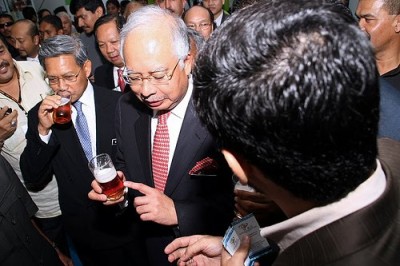New Mandala readers interested in Malaysia, may want to read my take on the coming general election in Malaysia. I have an article in Asia Currents, the electronic newsletter of the Asian Studies Association of Australia (ASAA), that discusses what I think are the key issues, how they are likely to impact on the two coalitions, and the ability of the two coalitions to respond to these issues. I note that there are five critical issues that the two coalitions will have to face both in the short and long term.
Five critical megatrends face the contenders at the national level: economic performance, demographic changes, urbanisation, Islamisation and an island/peninsular divide. The middle-income trap: The popular diagnosis for Malaysia’s stagnating economic performance is that Malaysia is caught in a middle-income trap, where it is unable to compete with low-cost producers on cost, but also by not having the institutions, human resources and technological capabilities to compete with advanced economies in innovative products and processes. A young nation: 71 per cent of Malaysians are under the age of 40, with 34 per cent aged between 20 and 40. An urban nation: 71 per cent of Malaysia is now urban, with only Kelantan, Pahang, Perlis, Sabah and Sarawak still being largely rural. Urbanisation rates are below 55 per cent. An Islamic nation: The pervasiveness of Islam as a political tool and the increasing piety among Muslims have reached unprecedented levels. Two nations: The politics of Peninsular Malaysia starkly differ from that of the island of Borneo. Political leaders and citizens in Sabah and Sarawak continue to distrust peninsular politicians, and all politics in these two states is local.
I conclude that the coalition that is better able at managing these megatrends, will have the better chance of winning, and staying in power.
The two main contenders have framed their arguments for support in a contrasting manner. UMNO, through the BN, has argued that social stability delivers economic growth and that only a strong UMNO can guarantee social stability. At the 13th general election, UMNO will be arguing that it has the track record in delivering social stability and economic growth. PR, instead, is arguing that good governance and social justice are critical to Malaysia’s continued economic growth and social stability. PR argues that the persistent weakening of the Malaysian economy, and social unrest, are due to the BN’s mismanagement of the economy, its divisive racial and religious politics, and the abuse of the rule of law. The 2008 general election solidified the two-coalition system, and this is unlikely to be reversed. The surprising aspect of this development is that it took opposition parties 50-odd years to cooperate effectively, considering that Malaysians never gave the BN, on average, more than 57 per cent of the popular votes–with its best-ever result of 65 per cent achieved only in the booming 90s, at the 1995 general election. Malaysians have demonstrated time and again that, despite its hegemony, the BN is not an overwhelmingly popular coalition. While the results of the 13th general election will depend mainly on the leadership abilities of Najib Razak and Anwar Ibrahim to manage their coalitions in addressing issues, neither coalition will remain in power for long–even with the support of a rigged electoral system–if it fails to address these megatrends effectively.
 Facebook
Facebook  Twitter
Twitter  Soundcloud
Soundcloud  Youtube
Youtube  Rss
Rss 